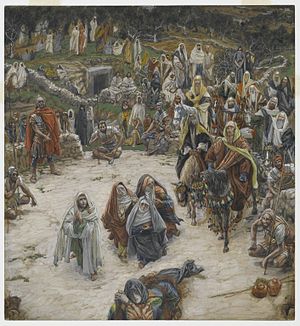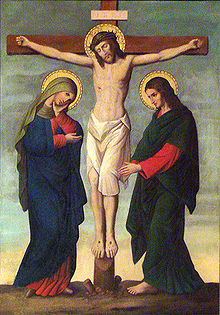- Sayings of Jesus on the cross
-
There are seven expressions traditionally attributed to Jesus during his crucifixion, gathered from the four Canonical Gospels.[1][2] Three of the sayings appear exclusively in the Gospel of Luke and three appear exclusively in the Gospel of John. The other saying appears both in the Gospel of Mark and the Gospel of Matthew.[3] In Mark and Matthew, Jesus cries out to God. In Luke, he forgives his killers, reassures the good thief, and commends his spirit to the Father. In John, he speaks to his mother, says he thirsts, and declares the end of his earthly life.
Since the 16th century these sayings have been widely used in the preachings on Good Friday and entire books have been written on the theological analysis, and the devotional elements of the seven sayings.[3][4][5][6]
Physicians and scientists who have studied the medical aspects of the crucifixion concluded that the sayings had to be short because crucifixion causes asphyxia. This makes inhaling air to speak difficult and painful, especially as death approaches.[7][8][9][10]
The seven sayings tradition is an example of the Christian approach to the construction of a Gospel harmony, in which material from different Gospels is combined, producing an account that goes beyond each Gospel.[3][11] James Dunn considers the sayings as are part of the elaborations in the diverse retellings of Jesus' final hours.[12]
Contents
Seven sayings
The seven sayings form part of a Christian meditation that is often used during Lent, Holy Week and Good Friday. The traditional order of the sayings is:[13]
- Father forgive them, for they know not what they do (Luke 23:34).
- Truly, I say to you, today you will be with me in paradise (Luke 23:43).
- Woman, behold your son: behold your mother (John 19:26-27).
- My God, My God, why have you forsaken me, (Matthew 27:46 and Mark 15:34).
- I thirst (John 19:28).
- It is finished (John 19:30).
- Father, into your hands I commit my spirit (Luke 23:46).
Traditionally, these seven sayings are called words of 1. Forgiveness, 2. Salvation, 3. Relationship, 4. Abandonment, 5. Distress, 6. Triumph and 7. Reunion.[14]
As can be seen from the above list, not all seven sayings can be found in any one account of Jesus' crucifixion. The ordering is a harmonisation of the texts from each of the four canonical gospels. In the gospels of Matthew and Mark, Jesus is quoted in Aramaic, shouting the fourth phrase only, and cries out wordlessly before dying. In Luke's Gospel, the first, second, and seventh sayings occur. The third, fifth and sixth sayings can only be found in John's Gospel. In other words:
- In Matthew and Mark :
- My God, My God, why have you forsaken me?
- In Luke:
- Father forgive them, for they know not what they do
- Truly, I say to you, today you will be with me in paradise (in response to one of the two thieves crucified next to him)
- Father, into your hands I commit my spirit (last words)
- In John:
- Woman, behold your son: behold your mother (directed at Mary, the mother of Jesus, either as a self reference, or as a reference to the beloved disciple and an instruction to the disciple himself)
- I thirst (just before a wetted sponge, mentioned by all the Canonical Gospels, is offered)
- It is finished (last words)
Father forgive them, for they know not what they do
- Then Jesus said, "Father forgive them, for they know not what they do".
This first saying of Jesus on the cross is traditionally called "The Word of Forgiveness".[14] It is theologically interpreted as Jesus' prayer for forgiveness for those who were crucifying him: the Roman soldiers, and apparently for all others who were involved in his crucifixion.[15][16][17][18] However, many early manuscripts omit Luke 23:34.[19]
Today you will be with me in paradise
- And he said to him, "Truly, I say to you, today you will be with me in paradise".
This saying is traditionally called "The Word of Salvation".[14] According to Luke's Gospel, Jesus was crucified between two thieves, one of whom supports Jesus' innocence and asks him to remember him when he comes into his kingdom. Jesus replies, "Truly, I say to you..." (ἀμήν λέγω σοί, amēn legō soi), followed with the only appearance of the word "paradise" in the Gospels (παραδείσω, paradeisō, from the Persian pairidaeza "paradise garden").
Behold your son: behold your mother
- Jesus saw his own mother, and the disciple standing near whom he loved, he said to his mother, "Woman, behold your son". Then he said to the disciple, "Behold your mother". And from that hour, he took his mother into his family.
This statement is traditionally called "The Word of Relationship" and in it Jesus entrusts Mary, his mother, into the care of "the disciple whom Jesus loved".[14]
My God, my God, why have you forsaken me
- Around the ninth hour, Jesus shouted in a loud voice, saying "Eli Eli lama sabachthani?" which is, "My God, my God, why have you forsaken me?"
- And at the ninth hour, Jesus shouted in a loud voice, "Eloi Eloi lama sabachthani?" which is translated, "My God, my God, why have you forsaken me?"
This saying is traditionally called "The Word of Abandonment" and is the only saying that appears in more than one Gospel.[14] This saying is given in Aramaic with a translation (originally in Greek) after it. This phrase is the opening line of Psalm 22, a psalm about persecution, the mercy and salvation of God. It was common for people at this time to reference songs by quoting their first lines. In the verses immediately following this saying, in both Gospels, the onlookers who hear Jesus' cry understand him to be calling for help from Elijah (Eliyyâ). The slight differences between the two gospel accounts are most probably due to dialect. Matthew's version seems to have been more influenced by Hebrew, whereas Mark's is perhaps more colloquial.
The phrase could be either:
-
- אלי אלי למה עזבתני [ēlî ēlî lamâ azavtanî]; or
- אלי אלי למא שבקתני [ēlî ēlî lamâ šabaqtanî]; or
- אלהי אלהי למא שבקתני [ēlâhî ēlâhî lamâ šabaqtanî]
The Aramaic word šabaqtanî is based on the verb šabaq, 'to allow, to permit, to forgive, and to forsake', with the perfect tense ending -t (2nd person singular: 'you'), and the object suffix -anî (1st person singular: 'me').[20]
A. T. Robertson noted that the "so-called Gospel of Peter 1.5 preserves this saying in a Docetic (Cerinthian) form: 'My power, my power, thou hast forsaken me!'"[21]
I thirst
- He said, "I thirst".
This statement is traditionally called "The Word of Distress" and is compared and contrasted with the encounter of Jesus with the Samaritan Woman at the Well in John 4:4-26.[14]
It is finished
- Jesus said, "It is finished".
This statement is traditionally called "The Word of Triumph" and is theologically interpreted as the announcement of the end of the earthly life of Jesus, in anticipation for the Resurrection.[14]
Father, into your hands I commit my spirit
- And speaking in a loud voice, Jesus said, "Father, into your hands I commit my spirit".
From Psalm 31, this saying, which is an announcement and not a request, is traditionally called "The Word of Reunion" and is theologically interpreted as the proclamation of Jesus joining the God the Father in Heaven.[14]
Theological interpretations
The last words of Jesus have been the subject of a wide range of Christian teachings and sermons, and a number of authors have written books specifically devoted to the last sayings of Christ.[22][23][24]
Priest and author Timothy Radcliffe states that in the Bible, seven is the number of perfection, and he views the seven last words as God's completion of the circle of creation and performs analysis of the structure of the seven last words to obtain further insight.[25]
Historicity of the sayings
James Dunn considers the seven sayings weakly rooted in tradition and sees them as a part of the elaborations in the diverse retellings of Jesus' final hours.[12] Dunn, however, argues in favor of the authenticity of the Mark/Matthew saying in that by presenting Jesus as seeing himself 'forsaken' it would have been an embarrassment to the early Church, and hence would not have been invented.[12] Geza Vermes, states that the first saying from (Mark and Matthew) is a quotation from Psalm 22, and is therefore occasionally seen as a theological and literary device employed by the writers.[26] According to Vermes, attempts to interpret the expression as a hopeful reference to scripture provide indirect evidence that it is an authentic cry of despair.[27] Leslie Houlden, on the other hand, states that Luke may have deliberately excluded the Mark/Matthew saying from his Gospel because it did not fit in the model of Jesus he was presenting.[3][5]
See also
Notes
- ^ Geoffrey W. Bromiley, International Standard Bible Encyclopedia, Eerdmans Press 1995, ISBN 0802837840 page 426
- ^ Joseph F. Kelly, An Introduction to the New Testament for Catholics Liturgical Press, 2006 ISBN 978-0-8146-5216-9 page 153
- ^ a b c d Jesus: the complete guide by Leslie Houlden 2006 ISBN 082648011X page 627
- ^ Jesus of Nazareth by W. Mccrocklin 2006 ISBN 1597818631 page 134
- ^ a b Jesus in history, thought, and culture: an encyclopedia, Volume 1 by James Leslie Houlden 2003 ISBN 1576078566 page 645
- ^ The Seven Last Words From The Cross by Fleming Rutledge 2004 ISBN 0802827861 pages 8-10
- ^ Columbia University page of Pierre Barbet on Crucifixion
- ^ Barbet, Pierre. Doctor at Calvary, New York: Image Books, 1963.
- ^ Frederick Zugibe, 2005, The Crucifixion of Jesus: A Forensic Inquiry Evans Publishing, ISBN 1-59077-070-6
- ^ Catholic Doctors on Crucifixion
- ^ Ehrman, Bart D.. Jesus, Interrupted, HarperCollins, 2009. ISBN 0-06-117393-2
- ^ a b c James G. D. Dunn, Jesus Remembered, Eerdmans, 2003, pp 779-781.
- ^ Jan Majernik, The Synoptics, Emmaus Road Press: 2005 ISBN 1-931018-31-6, page 190
- ^ a b c d e f g h The International Standard Bible Encyclopedia by Geoffrey W. Bromiley 1988 ISBN 0802837859 page 426
- ^ Vernon K. Robbins in Literary studies in Luke-Acts by Richard P. Thompson (editor) 1998 ISBN 0865545634 pages 200-201
- ^ Mercer dictionary of the Bible by Watson E. Mills, Roger Aubrey Bullard 1998 ISBN 0865543739 page 648
- ^ Reading Luke-Acts: dynamics of Biblical narrative by William S. Kurz 1993 ISBN 0664254411 page 201
- ^ Luke's presentation of Jesus: a Christology by de:Robert F. O'Toole 2004 ISBN 8876536256 page 215
- ^ Steven L. Cox, Kendell H Easley, 2007 Harmony of the Gospels ISBN 0-8054-9444-8 page 234
- ^ Dictionary of biblical tradition in English literature by David L. Jeffrey 1993 ISBN 0-8028-3634-8 page 233
- ^ Robertson's Word Pictures of the New Testament (Broadman-Holman, 1973), vol. 1. ISBN 0-8054-1307-3.
- ^ David Anderson-Berry, The Seven Sayings of Christ on the Cross, Glasgow: Pickering & Inglis Publishers, 1871
- ^ Arthur Pink, The Seven Sayings of the Saviour on the Cross, Baker Books 2005, ISBN 0-8010-6573-9
- ^ Simon Peter Long, The wounded Word: A brief meditation on the seven sayings of Christ on the cross, Baker Books 1966
- ^ Timothy Radcliffe, 2005 Seven Last Words, ISBN 0-86012-397-9 page 11
- ^ Geza Vermes, The Passion, Penguin 2005, page 75.
- ^ Vermes, Géza. The authentic gospel of Jesus. London, Penguin Books. 2004.
References
- The Reader's Encyclopedia, Second Edition 1965, publisher Thomas Y. Crowell Co., New York, editions 1948, 1955. Library of Congress Catalog Card No. 65-12510, pages 917- 918
External links
- The Seven Last Words of Christ Bethany Christian Church, Easter 1974, Pastor: Ben H. Swett.
Categories:- Crucifixion
- Jesus and history
- New Testament words and phrases
- Sayings of Jesus
Wikimedia Foundation. 2010.



